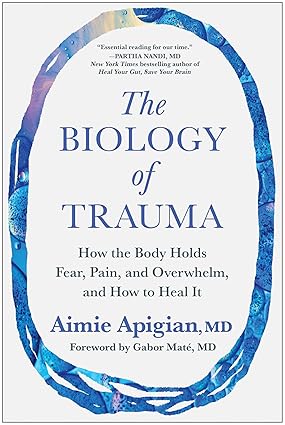Audiences will find comfort in the capable hands of Dr. Apigian.
The Biology of Trauma: How the Body Holds Fear, Pain, and Overwhelm, and How to Heal It is a work that reframes trauma as a biological condition rooted in the body’s survival systems rather than a problem confined to the mind. Drawing on her background as a physician, her own healing process, and years of clinical work, Aimie Apigian, MD, explains how unresolved trauma reshapes biology on multiple levels, influencing cellular activity, energy production, immunity, and even digestion. Through accessible explanations and case studies of real patients, Dr. Apigian further shows how trauma responses can surface as other issues, ranging from chronic fatigue to physical pain. Central to her approach is the idea of the “critical line of overwhelm,” emphasizing that holding on to trauma is not defined by the severity of an external event, but by the body’s response when powerlessness overrides capacity. She introduces the “Four Levels of Reset”—mind, body, biology, and neuroception—as dimensions to explore for recovery, and organizes her Biology of Trauma Framework around the essential “Three Rs”: recognizing patterns, identifying root causes, and implementing repair strategies. Integrating neuroscience, somatic methods, and functional medicine, Dr. Apigian offers both practitioners and individuals a compassionate and science-based guide, encouraging readers to move past managing symptoms toward lasting regulation, resilience, and the embodied experience of safety.
The Biology of Trauma presents a soothing balance between sensitive emotional topics and clear, scientific study. This work is grounded in both research and lived clinical experience, making a significant difference in the way Dr. Apigian’s thoughtful and scientifically rigorous trauma theory is presented. Ideas build cohesively in the organizational flow of information, and the manageable use of technical language and clear explanations make complex biology accessible without oversimplification. Case studies, such as Laura, a mindful yoga instructor, help personalize the science and bring hope to trauma-burdened individuals who can turn to this book for answers in a safe space. Audiences will find comfort in the capable hands of Dr. Apigian, who writes with a strong voice and an optimistic perspective that portrays trauma as an adaptive process, not a personal failing. The research addresses many overlooked connections between trauma and chronic illness and explains ways in which it manifests as disease. This reassuring approach is uplifting and empowering to all those who choose to explore these deep connections between mind, body, and functional medicine. Having left no stone unturned on this very personal topic, Dr. Aimie Apigian has crafted and assembled a transformative resource in The Biology of Trauma, a book that offers practical tools alongside deep insight.







